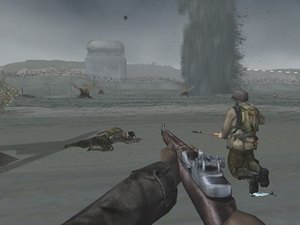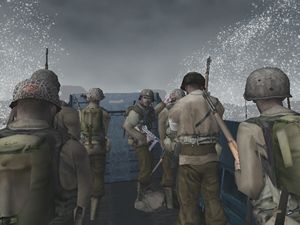How the World War was won.
War is a horrible, bloody, terrifying ordeal. If military fighting were to break out on American soil today, there’s no doubt that the Game Revolution crew would serve our country proud – from behind the warm glow of a computer screen, that is. Or in this a case, a control pad. We bruise easy.
Rarely have we looked forward to war as much as with EA’s stylish Medal
of Honor: Frontline, which finally made it out of boot camp and on to my
Playstation 2. It’s a truly prestigious medal indeed, yet not completely bereft
of a few scuff marks.
One
of these is the linear gameplay, which can be attributed to a plot based on
real-life events. There’s nothing wrong with real-life adaptations, although
the closer you follow the real-life model, the less flexibility you have regarding
story. Still, this one is done exceptionally well.
You play through 19 engrossing, war-torn missions, all of which have been seen before in movies and/or previous video games. It’s June 6, 1944. You take 24 year-old Lieutenant James Patterson from the great battle on the Omaha beach in Normandy all the way to Market Garden. Objectives run the gaming gamut, from low-level commands such as clearing an area of hostiles and providing cover fire to more famous feats deep behind enemy lines like seizing the Nijmegen Bridge, sabotaging German U-Boats and, of course, defeating the ominous Nazi War Machine.
Speaking of War Machines, the Playstation 2 works overtime to capture the
chaos of war in vivid detail. In other words, she looks and sounds gorgeous.
The map design is inspired (albeit a bit familiar – Medal
of Honor: AA, Saving Private Ryan, etc.) and the textures are smooth
and convincing. Characters move nicely, are modeled well and have moving lips
and eyes. The overall attention to detail is easily PC quality.
This is represented, irrefutably, in the more chaotic battles. Your first
mission, Finest Hour, is brimming with the kind of prime atmospheric video game
moments usually found in PC games. Bodies fly in the air while aircraft whiz
past overhead, randomly dumping bombs that kill you and/or vibrate your controller.
The effect is supremely engrossing.
MOH: Frontline is a feast for the ears as well as the eyes, and the
sounds compliment the entire package with various types of gunfire, ambient
noises, conversations in the distance and great explosions which shake the image
on-screen and make precise targeting impossible. It’s sheer carnage. Hearing
a hoarse commanding officer bark orders at you while the world is ending requires
precognitive skill and adds splendidly to the game’s intensity.
While real war may be alien to most gamers, MOH: Frontline‘s gameplay
is far from it. Surviving and completing your objectives is a matter of shooting
your way through hordes of Nazis (The Universal Enemy) in order to plant a bomb,
meet your contact, or simply reach the door that progresses you further. The
gameplay is strictly linear, but your objectives are varied enough to keep things
interesting.
The game’s sixty-year old munitions will also keep you on your toes. There
are a total of 18 authentic WWII weapons with authentic WWII drawbacks and hindrances.
You’ll wrestle with the Thompson sub-machine gun and its incredible kick, the
M1 Garand that can’t be reloaded until the clip is completely spent, grenades
that can reduce your hand to hamburger before you can even throw them, and many
other exquisitely tweaked real-world weapons. They may seem like deathtraps
to the untrained civilian, but they’ll become your best friends for about 10-15
hours of grueling battle-ridden gameplay.
 It’s
It’s
just a blast convincing the Nazis to dance, hop and twirl to your symphony of
bullets thanks to the cool hit detection. NPCs can lose their hats and remain
alive, hop around from a shot to the leg, stagger before toppling over – the
death animations are just great. Foes sniped from a distance may even look down
and put their hand to their chest where they received the wound, only to collapse
very soon after.
However, the AI isn’t that impressive. Enemies will hide behind objects and
blindly shoot around corners, and you’ll even come across a couple Nazi officers
hiding behind a fallen friend and armed with pistols. But these events are the
result of good scripting and not good A.I. Often you can run right up behind
guys and they won’t turn around until it’s too late. Cool death sequences are
a nice way of making up for faulty AI and enticing the player to continue.
You’ll need a bit of enticing, too, because not much can save a console FPS from that infernal thumbstick control. To EA’s credit, this is easily the most user-friendly FPS the PS2 has seen thus far. Still, show me the guy who has more dexterity in his thumbs than most people do in their entire hand and I’ll show you a Shaolin Monk in seclusion practicing his “Golden Thumb” technique. There’s no thumbstick sensitivity toggle and my keyboard showed no response when I plugged it into the PS2 USB ports. Drat and double drat!
I said before that this was a medal harboring a few scuffs. Well, not
harboring is more pertinent here, as there is no multiplayer of any sort. This
is a shame, because the level design is great and would have lent itself nicely
to a Bot option and/or Player Vs. Player skirmishes.
What you do get is a near PC quality experience without the patches and expensive
hardware. MOH: Frontline is very linear and doesn’t warrant much of your
time after perhaps the third play through, but the ride is still very, very
fun. I guess this is what war is good for.

-
Award winning presentation
-
Satisfying death animations
-
Great weapons
-
Solid gameplay
-
Scripting better than AI
-
Very linear
-
No multiplayer
-
Not much replay







